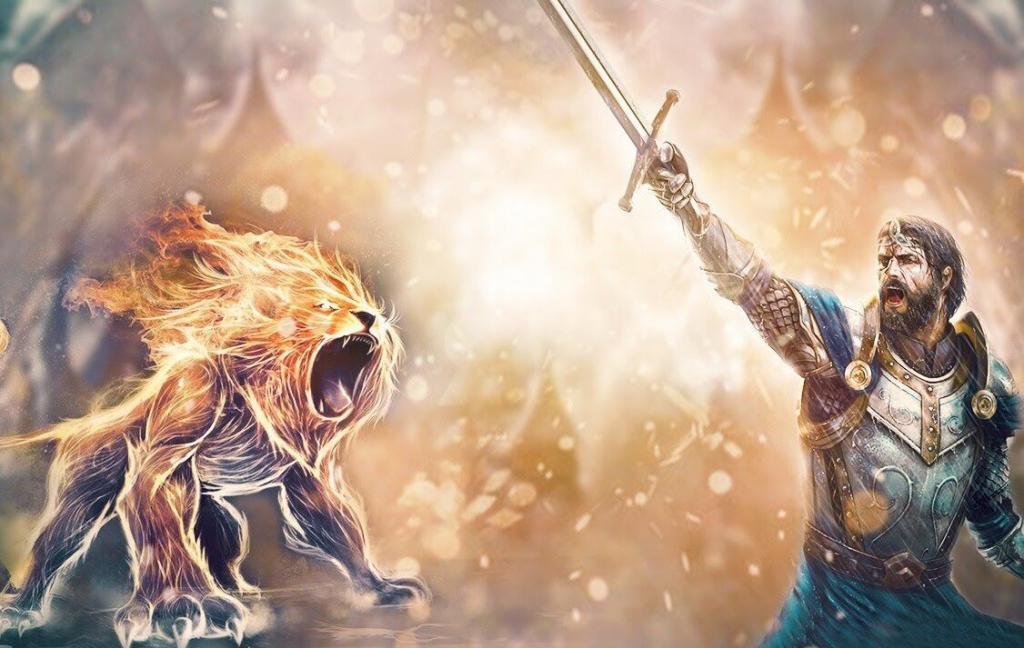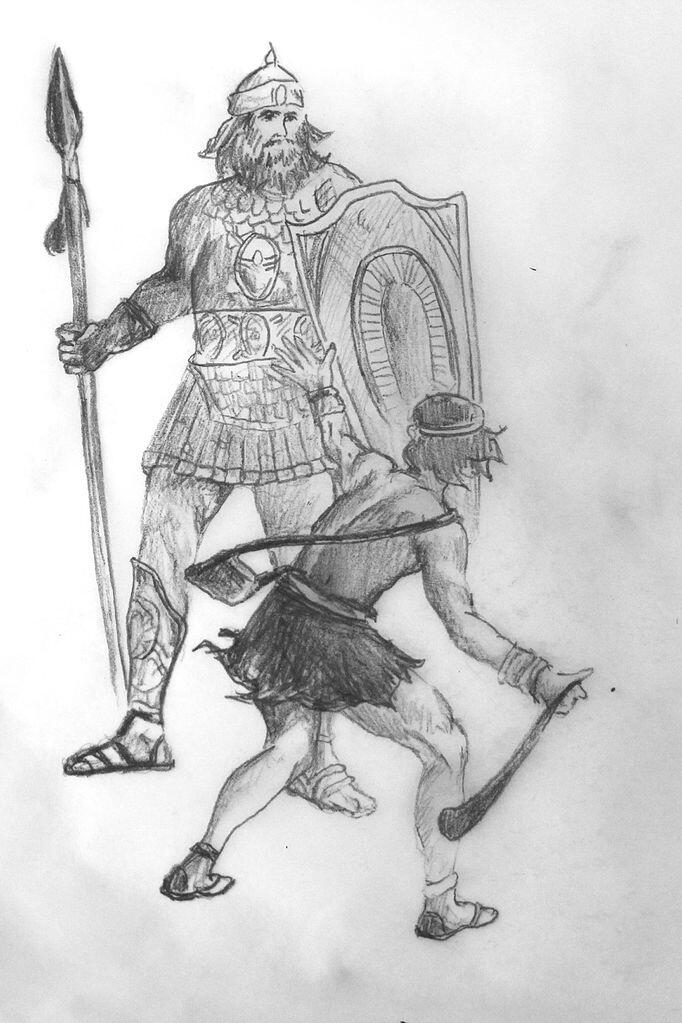
Let’s pretend that we’re playing Jeopardy. I’m the host and your the contestant. The category is “word definitions.” The clue is “The attempt to damage another human being, mentally, physically, emotionally, or socially.” If you answered bullying, you are correct. However, there is another word that fits the definition nearly just as well–and that word is evil. To do someone good is to intentionally build them up, whereas to do someone evil is to intentionally damage them. Bullying, it follows, is the essence of evil. The capacity for good and evil, premised on self- and other-awareness, is, in fact, one of the greatest distinctions between humans and animals. While animals merely follow their instincts, human begins act with intention, for better or worse.
The Legend Of David And Goliath
Today, I want to comment on a famous story in the Bible about overcoming evil–the story of David and Goliath. I think the story has become so familiar to Western culture, that we rarely stop to appreciate it for all its worth. In this article, I present key excerpts from the text, and I highlight a few germane details, especially as it relates to the topic of bullying. In era where bullying is as common as ever, both in-person and in cyber space, I think this special emphasis is instructive.
As the story goes, the Israelites and Philistines were camped against each other for war. A champion emerged in the Philistine camp named Goliath. Goliath had a massive physique, a brash demeanor, and loved talking trash. Goliath would come out every day to harass the Israelites with threats, taunts, and insults; and he ultimately issued a mortal challenge. The challenge was to a one-on-one death match with any Israelite who dared to fight him. According to the terms, the side whose champion lost would become the servants of the side whose champion won. Day after day, for 40 days in a row, Goliath repeated the same shtick, but no Israelite accepted the challenge because they were scared they would lose.
He [Goliath] stood and shouted to the ranks of Israel, “Why have you come out to draw up for battle? Am I not a Philistine, and are you not servants of Saul? Choose a man for yourselves, and let him come down to me. 9 If he is able to fight with me and kill me, then we will be your servants. But if I prevail against him and kill him, then you shall be our servants and serve us.†10 And the Philistine said, “I defy the ranks of Israel this day. Give me a man, that we may fight together.â€
1 Samuel 17:8-10
Goliath Was a Classical Bully
Goliath had many hallmarks of a bully. He was an enemy. An enemy, like a bully, seeks to damage its victim. Like a bully, Goliath engaged in verbal harassment. The context was military, so Goliath’s words accompanied the very real threat of physical violence. However, Goliath’s immediate goal was to tear the victim down psychologically, through repeat provocation. In other words, to exhaust and erode their pride and spirit–a strategy that was working to perfection. The Israelites were demoralized. They were miserable. Their self-esteem was damaged.
When Saul and all Israel heard these words of the Philistine, they were dismayed and greatly afraid.
1 Samuel 17:11
After 40 days, David entered the scene. He was too young to be present in the camp. However, his father sent him to bring food to his brothers. It just so happened that while David was there, Goliath came out to do his routine. David was having none of it. It is noteworthy that David proceeded to ask what the reward was for killing Goliath. Where everyone else focused on the challenge, David focused on the opportunity. David saw Goliath’s harassment, his provocations, his malice, his insults, his physical threats, as an opportunity to level up.
As he [David] talked with [his brothers], behold, the champion, the Philistine of Gath, Goliath by name, came up out of the ranks of the Philistines and spoke the same words as before. And David heard him. 24 All the men of Israel, when they saw the man, fled from him and were much afraid. 25 And the men of Israel said, “Have you seen this man who has come up? Surely he has come up to defy Israel. And the king will enrich the man who kills him with great riches and will give him his daughter and make his father’s house free in Israel.†26 And David said to the men who stood by him, “What shall be done for the man who kills this Philistine and takes away the reproach from Israel? For who is this uncircumcised Philistine, that he should defy the armies of the living God?†27 And the people answered him in the same way, “So shall it be done to the man who kills him.â€
1 Samuel 17:23-27
Of course, there was a generous material reward specific to this situation. However, it is generally true that ill-intentioned opposition can platform nobility and catalyze personal growth.
The Rise Of King David
After that, David insisted on fighting Goliath. When subject to the same bullying tactics as everyone else, David’s reaction was one of faith, instead of fear. It took a lot of convincing, but King Saul granted his request. David must have been very persuasive, because to let someone that young with a lack of experience represent the entire camp would have looked really bad on paper. If things did not go well, King Saul would surely have been held responsible for being a bad leader.
When the words that David spoke were heard, they repeated them before Saul, and he sent for him. 32 And David said to Saul, “Let no man’s heart fail because of him. Your servant will go and fight with this Philistine.†33 And Saul said to David, “You are not able to go against this Philistine to fight with him, for you are but a youth, and he has been a man of war from his youth.†34 But David said to Saul, “Your servant used to keep sheep for his father. And when there came a lion, or a bear, and took a lamb from the flock, 35 I went after him and struck him and delivered it out of his mouth. And if he arose against me, I caught him by his beard and struck him and killed him. 36 Your servant has struck down both lions and bears, and this uncircumcised Philistine shall be like one of them, for he has defied the armies of the living God.†37 And David said, “The Lord who delivered me from the paw of the lion and from the paw of the bear will deliver me from the hand of this Philistine.†And Saul said to David, “Go, and the Lord be with you!â€
1 Samuel 17:31-37
When David entered his face-off with Goliath, he was subject to additional harassment and threats, this time of a personal nature. However, the increased opposition only reinforced his faith. David rose psychologically, where everyone else wilted. He refused to be moved by the words of another man. God’s opinion, and his own opinion, weighed far more.
And the Philistine moved forward and came near to David, with his shield-bearer in front of him. 42 And when the Philistine looked and saw David, he disdained him, for he was but a youth, ruddy and handsome in appearance. 43 And the Philistine said to David, “Am I a dog, that you come to me with sticks?†And the Philistine cursed David by his gods. 44 The Philistine said to David, “Come to me, and I will give your flesh to the birds of the air and to the beasts of the field.†45 Then David said to the Philistine, “You come to me with a sword and with a spear and with a javelin, but I come to you in the name of the Lord of hosts, the God of the armies of Israel, whom you have defied. 46 This day the Lord will deliver you into my hand, and I will strike you down and cut off your head. And I will give the dead bodies of the host of the Philistines this day to the birds of the air and to the wild beasts of the earth, that all the earth may know that there is a God in Israel, 47 and that all this assembly may know that the Lord saves not with sword and spear. For the battle is the Lord’s, and he will give you into our hand.â€
1 Samuel 17:41-47
You probably know the rest of the story. David defeated Goliath–with a sling and a stone–and became a national hero. This event set David on a path to becoming Saul’s successor, and one of Israel’s greatest kings and prophets. David, in fact, developed such a special relationship with God that God promised that the messiah–Jesus Christ–would come through his lineage.

The story of David and Goliath is a story of faith overcoming fear. It’s a story of faith overcoming malice. It’s a story of faith overcoming bad odds. Whereas Goliath’s bullying broke down many, the effect wasn’t inevitable. David’s mental makeup was different than everyone else’s, including his own brothers. The small battles of faith he won when no one was watching empowered him to shine on the brightest stage. And the attitude of faith he assumed in the face of his biggest challenge yet–Goliath–catapulted his faith to unforeseen heights. Bully Is he
Bullying is an egregious manifestation of evil. It should never happen. However, whether we are young or old, we cannot always get people to do the right thing. When we cannot eradicate evil, we must overcome it–by not letting it crush our spirits, make us angry or bitter, or take away the thing that sustains us in this life, which is our faith. We should encourage others and stand up for them when we see them being bullied or harassed. And we should do the same for ourselves when subject to the same provocations.
The fear of the Lord is hatred of evil. Pride and arrogance and the way of evil and perverted speech I hate.
Proverbs 8:13
Do not be overcome by evil, but overcome evil with good.
Romans 12:21
For everyone who has been born of God overcomes the world. And this is the victory that has overcome the world—our faith.
1 John 5:4
For more, see the complete archive of articles on integrity.

